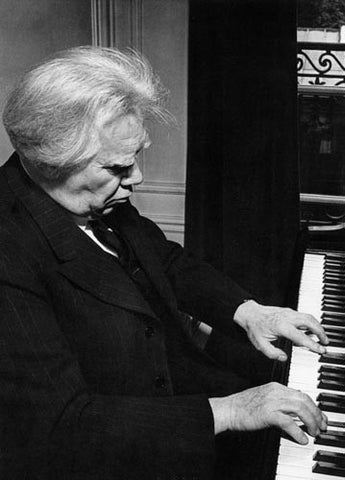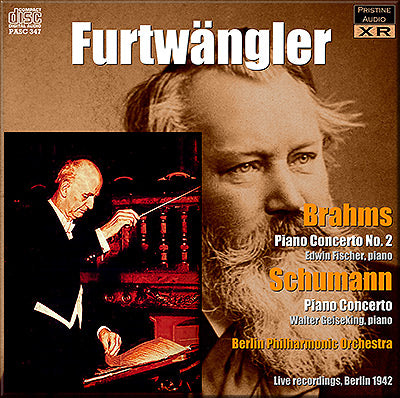Edwin Fischer

Edwin Fischer (6 October 1886 – 24 January 1960) was a Swiss classical pianist and conductor. He is regarded as one of the great interpreters of J.S. Bach and Mozart of the twentieth century.
Fischer was born in Basel and studied music first there, and later in Berlin at the Stern conservatory under Martin Krause. He first came to prominence as a pianist following World War I. In 1926, he became conductor of the Lübeck Musikverein and later conducted in Munich. In 1932 he formed his own chamber orchestra, and was one of the first to be interested in presenting music of the Baroque and Classical periods in a historically accurate way. Although his performances were not historically accurate by present-day standards, they were for his time; e.g., he did conduct Bach and Mozart concertos from the keyboard, an unusual practice at that time. His interpretations of Bach and Handel were Romantically conceived, with a wide dynamic range but often quite compelling.
In 1932 he returned once again to Berlin, succeeding his great contemporary Artur Schnabel in a teaching role at the Berlin Hochschule für Musik after Schnabel's exile (he was Jewish, and Fischer was not) from Nazi Germany. In 1942 he moved back to Switzerland, temporarily putting his career on hold through World War II. After the war he began to perform again, and gave master classes in Lucerne for a number of later prominent pianists such as Alfred Brendel, Helena Sá e Costa, Mario Feninger, the great Paul Badura-Skoda and the brilliant young Daniel Barenboim.
As well as solo recitals, concerto performances and conducting of orchestral concerts, Fischer was also engaged in chamber music. Particularly highly regarded was the piano trio he formed with the cellist Enrico Mainardi and the violinist Georg Kulenkampff, (who was replaced by Wolfgang Schneiderhan after Kulenkampff's death).
Fischer published a number of books on teaching, and one on the piano sonatas of Beethoven. He also made a number of recordings, including the first complete traversal of Bach's The Well-Tempered Clavier for EMI, recorded on the piano between 1933 and 1936. Other classic recordings by Fischer include Bach keyboard concertos, miscellaneous solo Bach works such as the Chromatic Fantasy and Fugue, various concertos and sonatas by Mozart and Beethoven, Schubert's "Wanderer" Fantasie (although he was not up to the transcendental technical demands of the finale) and Impromptus, and Beethoven's "Emperor" and Brahms' Second Concerto, both conducted by Wilhelm Furtwängler. Fischer's historically important recordings have been reissued on CD by EMI and by specialty labels such as APR, Music & Arts, Pearl, and Testament. Those of the Mozart Concertos K. 453, 466, 482, 491 & 503 (G major, D minor, E-flat major, C minor and C major) are particularly outstanding, especially the last three with the inspired, powerful conducting of John Barbirolli, Lawrance Collingwood and Josef Krips respectively, in 1935, 1937 & 1947.
Fischer also accompanied Elisabeth Schwarzkopf in a renowned early-to-mid-1950s EMI LP of Schubert Lieder. His last musical collaboration was with the violinist Gioconda de Vito. During their recording sessions for the Brahms violin sonatas Nos. 1 and 3, he had to go to London for medical treatment, where he was told he was seriously ill. He died shortly afterwards in Zurich.

Edwin Fischer
Edwin Fischer (6 October 1886 – 24 January 1960) was a Swiss classical pianist and conductor. He is regarded as one of the great interpreters of J.S. Bach and Mozart of the twentieth century.
Fischer was born in Basel and studied music first there, and later in Berlin at the Stern conservatory under Martin Krause. He first came to prominence as a pianist following World War I. In 1926, he became conductor of the Lübeck Musikverein a...
BRAHMS Piano Concerto No. 2
SCHUMANN Piano Concerto in A minor
Recorded in 1942
Total duration: 77:26
Edwin Fischer, piano (Brahms)
Walter Gieseking, piano (Schumann)
Berlin Philharmonic Orchestra
conductor Wilhelm Furtwängler
- Previous
- Page 2 of 2
-
Next

